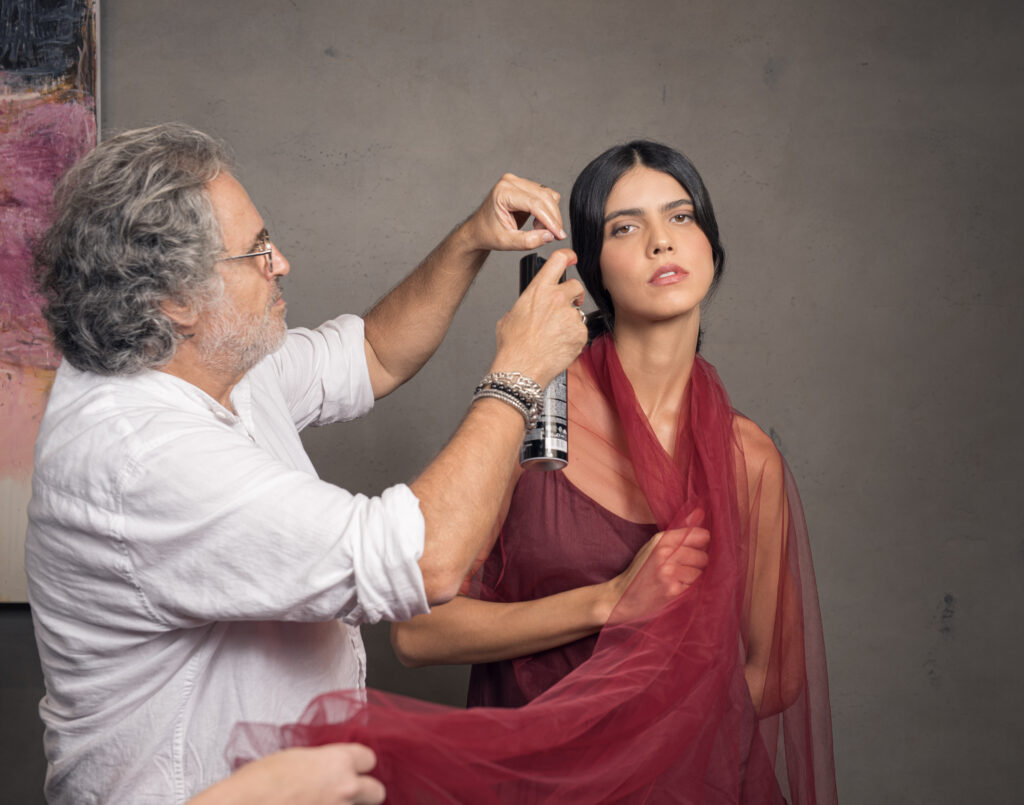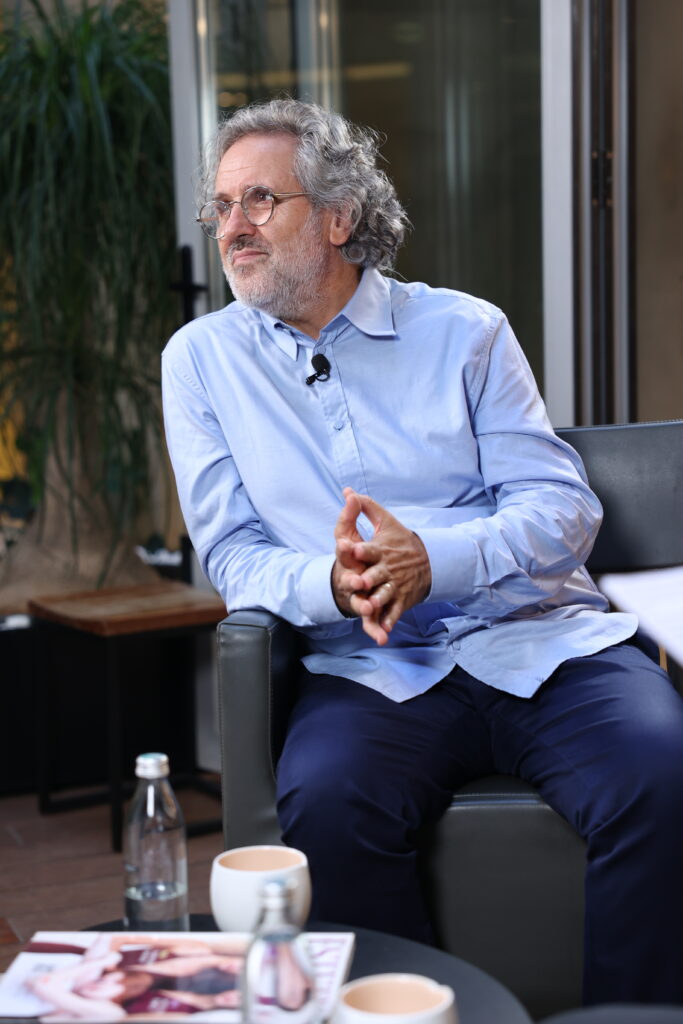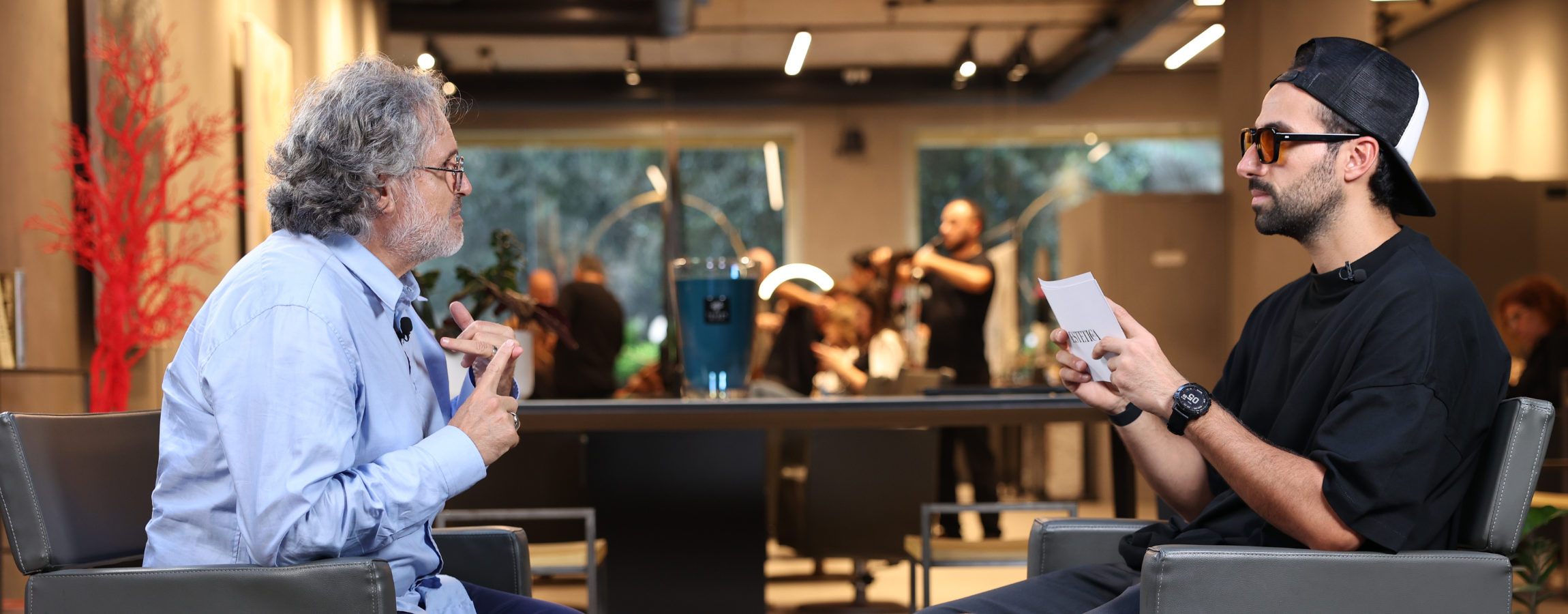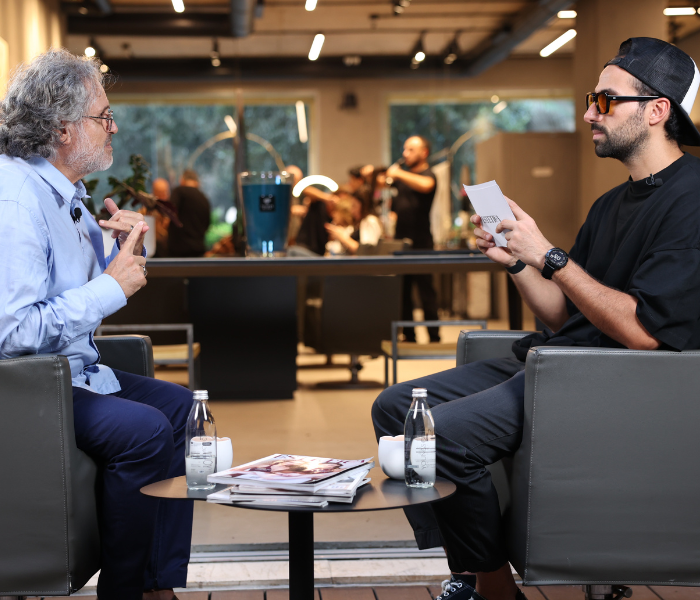- October 28, 2024
Resilience and Artistry: The Journey of Younes Eid
In a world often marked by chaos, a Lebanese hairdresser stands as a testament to resilience, reopening his salon time and again in the aftermath of conflict. Each transformation of hair becomes more than just a service; it’s a celebration of creativity and an assertion of beauty amid adversity. Hair and politics? What connection could unite them but a strand of hair? This narrative intertwines the art of hairstyling with the realities of life in a turbulent landscape, illustrating how passion and innovation thrive despite the odds.

For Estetica Middle East’s inaugural issue, a conversation of generations was essential—an intimate one, nonetheless. We explore the remarkable journey of Younes Eid, founder of Younes Eid Beirut, as he sits for a candid interview conducted by his son and fellow hairstylist, Hicham Eid. Together, they revisit the pivotal moments of Younes’s career, reflecting the profound connection between hair and the world that surrounds it—a story of hope and artistry.
Hicham begins the conversation by asking his father how he would define himself. With a thoughtful pause, Younes replies simply, “A coiffeur.” Yet, this humble label scarcely captures the essence of who he is. Younes Eid has always been more than just a hairstylist; he is an artist and a visionary. Over the past five decades, he has navigated a path laden with uncertainties—both personal and those dictated by the tumultuous world around him.
Twenty-five years ago, he was awarded the ESTETICA Salon Award for his modest Beirut salon. and he has since been nominated for the award once again. Through every accolade, Younes has remained grounded, never forgetting his humble beginnings.

“It was a stroke of chance that I became a coiffeur, because I was a failure in school,” he shares. As he recounts his early teens, Younes reveals a series of attempts at various crafts that left him feeling bitter—until he fell in love with hairstyling. His family wasn’t supportive of his decision. “They weren’t convinced; they asked me to look for something else. But I was certain I had found my place from the moment I stepped into this craft,” he says.
His first job was at a neighboring salon. After many rejections, fourteen-year-old Younes finally landed an opportunity to self-train and work at a nearby salon, paying the owner for the space he occupied. Observing his surroundings and following his instincts allowed him to become more comfortable and develop his own style. A new phase of Younes’s life began, and he felt its impact.
“That salon I entered; I loved the idea, and I loved the craft, but it wasn’t enough even back then. It wasn’t up to the level I had in mind. I thought being a hairdresser was something else—a whole another world,” he reflects. Though he was unsure of it at the time, he was right.
A pleasant encounter with a client who requested a simple chignon for a wedding she was attending proved Younes was different from his fellow salon workers. The salon owner’s wife took notice, even though the client had her hair done elsewhere, as it was noticeably different from what the salon’s staff usually offered. For Younes, the client’s pleased reaction motivated him to take the next step.
Younes decided to move to Paris in pursuit of his passion. It was 1977, and he hadn’t turned fifteen yet. “My parents wondered how I was traveling to Paris. I told them I was going to work and had a job secured, but reality couldn’t be more different. All I really had was my friend’s address.”
Despite the language barrier, Younes found his way to that address. “I landed in Paris on a Saturday night, and when I stood outside the airport, I didn’t know where to go. I avoided all taxi drivers who seemed French. When I found an Arab driver, I got into his cab and spoke to him in Arabic, asking him to take me to an affordable hotel. He was baffled,” Younes recalls. “He helped me, took me to a hotel, and booked me a room. The next day, I walked across Paris, marking the buildings so I could find my way back.”
It wasn’t until Tuesday, that Younes’s long-awaited reunion with his friend occurred. Thanks to him, Younes secured his first job outside his hometown. “I knew the salon owner only took pity on me, because I was young. He gave me the job, and I was extremely happy,” Younes says.
This is when Younes’s love for hair artistry began to flourish. He would spend nights at the salon, observing how artisanal haircuts were made. Gradually, he became an artisan himself. “I was lucky. They brought in someone from London, from Vidal Sassoon’s salon—his name was Anestis Cobella. Today he’s one of the very famous ones,” Younes remembers. “He trained the staff to do haircuts. There were just over ten people who were supposed to do the haircuts after the salon closed. Not many stayed late to help them set up, so I offered, and I was very happy to be there.”
While the senior staff learned geometric cuts, Younes meticulously observed. “The spoken language was a barrier, but the body language and the way the hands moved—I understood that,” he says. “The hands taught me how to do it. I grasped everything and learned just like the other guys there.”
What Younes recalls as the language of scissors taught him more than he could have ever imagined at such a young age. Humorously, he compares himself at that point in time to Doueik, a Lebanese television character from the seventies who portrays a villager embarking on a journey to the city. “His story resembled mine,” he says. “Doueik used to say: ‘Bonjour, our dame, Beirut!’ as he walked with his vegetable basket among the city’s cars, and on my journey, I would say: ‘Bonjour, our dame, Paris!’”

Not long after, Younes’s path led him back to Lebanon, where he initially didn’t intend to stay long. An accidental leg injury forced him to. His absence for eight months caused him to lose his French work permit. Uncertain about what to do next, especially given the circumstances in his home country at the time, Younes found himself amid the chaos of war. The Eids, who once opposed their son’s decision to pursue a career in hairstyling, decided to open a salon for him. Instantly, Younes put the skills he had brought back with him into practice, and soon after, his reputation grew.
“It was a twist of fate that I opened my own salon; that wasn’t even my plan. It just so happened that my parents were financially able to support me in taking this step,” he says. “I gained much popularity, especially with haircuts. I used to spend at least an hour to an hour and a quarter on each haircut, taking my time and caring deeply. It was like sculpting to me.”
The “revolution” that geometric haircuts created at the time, transcended through Younes’s work when he successfully introduced them to his humble clientele back home. “I had no idea I was going to gain so much popularity,” he admits.
This only fueled Younes’s thirst for knowledge. He was adamant about attending every seminar and festival that offered him the opportunity to learn about the latest trends in hair and beauty. Thus, he traveled again to Paris, London, New York, and Italy.
This naturally raises the question of whether talent trumps education in this field, or vice versa. For Younes, the answer is clear: “Talent, then talent, then talent again,” he says. “If talent is there, and you add education to that, you have a revolution. But if talent is absent, education alone may only take you so far.”
Perhaps this is what distinguishes a hairstylist from a true hair artist. As Younes explains, if your primary goal is to earn money, you can certainly achieve financial success in this industry—but you will never reach the level of an artist. However, when you find joy in your craft without focusing on monetary reward, your talent can create a life far richer than you ever imagined.
“I called it the profession of the unsuccessful, even though it truly isn’t that. But failure can occur at some stage in a person’s life, leading them into a profession they aren’t passionate about. They may earn a good income, but that alone is not enough,” he explains. “Earning a good income, opening your own salon, or buying a home—none of these are enough to truly fulfill your life. You may make a lot of money through it as a business, but you will never be an artist.”
In a world of creation and innovation, the secret to becoming an artist, according to Younes, is constantly honing your skills. “You must look at the hair, speak to it. You must feel it. You must observe and respond to what the hair wants,” he passionately explains. “For me, hair is a feeling. Sometimes, the hair might feel stubborn to me, and that’s because it’s not what it wants. You might be surprised by what I’m saying, but this is how I feel—that this is not what the hair truly desires. I don’t know if I’m the only one who feels this way, or if others share the same sentiment. There must be others among hairstylists who understand what I’m talking about.”
The connection that this artist shares with the object of his work deeply influences his perception of beauty. He believes that “a natural look” represents a classic style that will never fade. “When you work as a hairstylist, you must focus on femininity. Your goal is to help women showcase their femininity. There is a powerful femininity within every woman, but she may not always know how to reveal it. If you can bring it out, then hats off to you!” he asserts.



The tools he employs are equally crucial in achieving this timeless masterpiece, as Younes sees it. “A pair of scissors that isn’t of the highest quality will never yield a beautiful haircut, no matter how skilled you are as an artist. Everything you use—even a comb—must be appropriate for the hair; otherwise, the hair will suffer. The importance lies in the craftsmanship and material. Everything in your profession must be of the highest quality. Above all, you must be generous in your craft,” he concludes.
Younes Eid’s attention to detail and the values he brings to his work reflect the core principles he lives by on a personal level. He credits much of his journey to his wife, who sacrificed her university education for his career. Ever grateful, he recalls, “She was one of the first people to stand by me. She learned how to do makeup and supported me throughout my career, serving as a huge motivation along the way.”
As their family grew, Younes and his wife decided to open a larger salon, a pivotal step that led to his establishment in the capital, Beirut. “I worked really hard to get to where I was. I always felt I deserved a place in Beirut, just like every hairstylist I knew,” Younes reflects.
“Our life changed forever,” he states. This move marked a cornerstone in Younes Eid’s career, launching him onto the international stage and opening doors worldwide. Over time, his 350-square-meter salon, which he named Starco, earned him an Estetica Salon Award in early 2005. “L’Oréal held a competition at the time and asked if they could feature my salon in a shoot. I agreed, of course. They came and filmed while I resumed my work without much thought. I was surprised later when L’Oréal contacted me to join them in Cannes, as my salon had been chosen among the nine best salons in the world,” he remembers. “We built our salon with passion and dedication, and it earned us a prestigious award, placing us in the top three globally. I received the award in Cannes.”
Younes was celebrating both personally and professionally. He began to see his country’s success reflected in his own, and vice versa, as Lebanon regained its status on the international stage after years of turmoil. “Before the war, there were big salons, which I was too young to remember. I used to hear about them,” he recalls. “It was a golden age for Lebanon. I remember being in Paris with a famous hairdresser who said, ‘I learned how to do a chignon in Beirut,’ even though he was an international figure.”
Despite his gratitude for international recognition, Younes remained grounded, particularly after receiving the award. “We didn’t give the award its due recognition, as I’ve never been fond of the media. I preferred to work quietly. Silence has always been fundamental to my life, so perhaps we didn’t fully honor the award, even though it represented successful work that was globally appreciated.”
However, Younes’s aspirations and achievements in the heart of Beirut were soon overshadowed by the resurgence of conflict. On February 14, 2005, downtown Beirut became the site of the assassination of Lebanese politician and former Prime Minister Rafic Hariri. The explosion that took his life also wreaked havoc on Younes Eid’s brand-new salon. “We weren’t far from the explosion, and the salon was destroyed,” he recounts. Although Younes and his team quickly regrouped, the following years proved challenging. “We’ve been in business for around 20 years, and we’ve experienced three explosions,” he states. “The second explosion was about 20 meters away from the salon, and it completely obliterated it. It was massive, but banks were able to provide funds for repairs. We could fix the glass and everything within a week,” he notes, referring to the financial crisis that imposed severe withdrawal restrictions, pushing Lebanon’s banking system to the brink of collapse in late 2019, less than a year before the explosion that devastated the country physically, economically, and emotionally.
“It was then that the salon was completely destroyed. If it weren’t for the tempered glass in place, when we had over 60 clients at our salon, it would have been an even more horrific situation,” he says. “I will never forget that day as long as I live. People were like zombies on the streets. When I reached the salon, I couldn’t believe it. I was thankful for the safety of my clients, my wife, and my son, who were all inside.”
It was then that Younes faced the painful decision to close his establishment for good. Three explosions weighed heavily on his heart. “That night, I lay down and couldn’t stop thinking about my decision. I felt it was a defeat, and I wasn’t used to being defeated,” he recalls. “I had accounting offices on the tenth floor of the same building. I decided to open a small temporary salon there, with the great help of my wife and son, who gathered the remnants of the old salon and reopened within a week.”
Despite the pain and limited resources, Younes Eid and his team overcame this hardship, welcoming clients again within days. Sharing in the suffering, Younes’s son, Hicham, asks his father if these harsh experiences had positively influenced his journey. Younes’s response encapsulated resilience: “There comes a time when circumstances can weaken your resolve. When you’re at your peak, focused on your goals, and something disrupts you, it can be disheartening. However, over time, you calm down and return to a positive mindset, telling yourself, ‘I want to keep going; I can’t stop.’ These are the realities of our country, and since childhood, we’ve grown accustomed to this way of life. Without a doubt, we will rise each time we fall.”
This mindset has been what sustained Younes Eid year after year. “You have to keep going; you can't stop, or it’ll be the end of you,” he asserts. “I didn’t want this to be the end of me. I keep feeling like I have more to give.” In pursuit of creativity, he has recently embraced painting as another form of art. Instead of retreating, last year Younes celebrated the opening of his new salon, its walls adorned with his artwork—a personal haven where his comb and paintbrush coexist.
“I was drawing and felt happy, but something inside me insisted that I return,” he tells Hicham. “You suggested we open a salon together in Dubai, and for a while, I agreed, but something within me kept urging me to return to Beirut because Beirut is my passion. Beirut is the foundation, the dream. She’s everything.”
As another war engulfs his beloved Beirut, leaving him in yet another limbo, Younes sits in his salon—his sanctuary amid chaos—and discusses how turmoil can inspire innovation and shape life. His belief that there’s always light at the end of the tunnel resonates with his son, particularly when they discuss seemingly minor issues that nonetheless impact the business, like social media marketing. “Social media has become a significant part of life. I might have discovered it late, but I’m approaching it simply,” Younes says, to which Hicham replies, “I think you’re doing it the Younes Eid way.”
This seamless connection between father and son opens the door to discussions of legacy. Hicham asks: Is this craft hereditary? Will the sons carry on their father’s legacy?
In true ‘Younes Eid way,’ the father responds: “I would have preferred for my children to pursue different paths. I wasn’t sure if they shared the same passion to continue the journey just for the sake of the name. I always encouraged them to get an education and explore other directions.” Younes continues, “As fate would have it, my eldest insisted on becoming a hairdresser. He studied business but felt drawn to hairdressing. Later on, he decided to open a business that complemented his hairdressing career.” He pauses, reflecting. “Then there’s you— you left for Canada, earned a degree in 3D animation and film production, and after several years, you eventually expressed a desire to become a hairdresser, which I initially resisted because I wanted you to stick with the fields you studied.”
Clearly, neither Hicham nor his brother Haysam could distance themselves from the craft their father passionately pursued. Years spent in the salon shaped their futures and solidified their father’s legacy. Younes hadn’t considered what his legacy might be in the years to come, but he arrives at a realization: “I let go and pursued what I loved. I did what I could with it. I would love for the name to continue. If you and your brother could carry it on in your own way, that would mean everything to me.” He concludes, “I believe that names that make a difference never fade. They endure, no matter what.”


